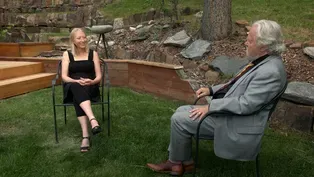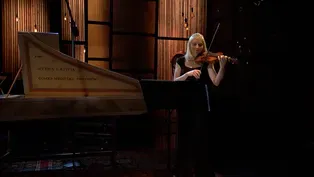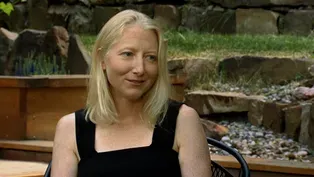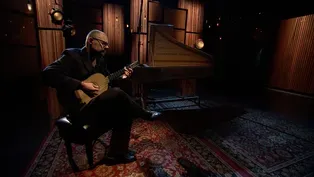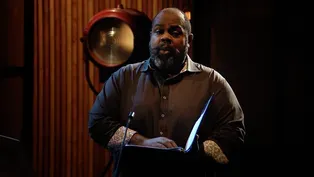11th and Grant
Baroque Music Montana
Season 14 Episode 6 | 57m 46sVideo has Closed Captions
Baroque Music Montana showcases one of the most diverse periods in music history.
Baroque Music Montana performs works by celebrated composers of the baroque, as well as pieces rarely or unheard since the seventeenth and eighteenth century. Carrie Krause, a baroque and modern violinist, and seasoned expert on some of music history’s greatest masterpieces, is joined by countertenor Reginald Mobley, Elliot Figg on Harpsichord, and John Lenti on theorbo and baroque guitar.
Problems with Closed Captions? Closed Captioning Feedback
Problems with Closed Captions? Closed Captioning Feedback
11th and Grant is a local public television program presented by Montana PBS
11th & Grant with Eric Funk is made possible by: The Greater Montana Foundation, Montana State University, office of the President, Quinn’s Hot Springs Resort, The Gilhousen Family Foundation, Donna...
11th and Grant
Baroque Music Montana
Season 14 Episode 6 | 57m 46sVideo has Closed Captions
Baroque Music Montana performs works by celebrated composers of the baroque, as well as pieces rarely or unheard since the seventeenth and eighteenth century. Carrie Krause, a baroque and modern violinist, and seasoned expert on some of music history’s greatest masterpieces, is joined by countertenor Reginald Mobley, Elliot Figg on Harpsichord, and John Lenti on theorbo and baroque guitar.
Problems with Closed Captions? Closed Captioning Feedback
How to Watch 11th and Grant
11th and Grant is available to stream on pbs.org and the free PBS App, available on iPhone, Apple TV, Android TV, Android smartphones, Amazon Fire TV, Amazon Fire Tablet, Roku, Samsung Smart TV, and Vizio.
Providing Support for PBS.org
Learn Moreabout PBS online sponsorship(lively baroque music) - Hi.
I'm Eric Funk.
Tonight on "11th & Grant," Baroque Music Montana performs enchanting music of the 18th century.
(vocalist singing in Italian) (lively baroque music) - I find it just incredibly inspiring.
Playing Bach is like reading a map.
It's all there.
You just have to read the map and follow it, but, on the other hand, there's so much room for invention.
Bach was such an incredible improviser and the tradition was that you should add all of this, you know, personal take on it.
(solemn baroque music) (solemn baroque music continues) - Baroque Music Montana, featuring historical instruments and works by Handel, Bach, Henry Purcell, and John Dowland, next on "11th & Grant."
(vocalist singing in Latin) (solemn baroque music) - [Presenter] "11th & Grant" was made possible by the Greater Montana Foundation, encouraging communication on issues, trends, and values of importance to Montanans.
Montana State University Office of the President.
Quinn's Hot Springs Resort.
The Gilhousen Family Foundation.
Donna Spitzer-Ostrovsky, in loving memory of Jack Ostrovsky, the godfather of "11th & Grant."
Iris M-L Model.
Sanderson Stewart, enduring community design.
Music Villa, proudly offering Gibson acoustic guitars.
Bill and Jane Gum.
Sal and Carol G. Lalani.
Poindexter's, inspired technologies for a more vibrant life.
Bob and Karin Utzinger.
Mary Routhier.
The Rocking R Bar.
Stockman Bank.
And by these generous donors.
(lively jazz music) (lively jazz music continues) (lively jazz music continues) (lively jazz music continues) (upbeat baroque music) (upbeat baroque music continues) (upbeat baroque music continues) (upbeat baroque music continues) (upbeat baroque music continues) (upbeat baroque music continues) (upbeat baroque music continues) (upbeat baroque music continues) (upbeat baroque music continues) (upbeat baroque music continues) (upbeat baroque music continues) (upbeat baroque music continues) (upbeat baroque music continues) (upbeat baroque music continues) (upbeat baroque music continues) (upbeat baroque music continues) (upbeat baroque music continues) (upbeat baroque music continues) (upbeat baroque music continues) (upbeat baroque music continues) (upbeat baroque music continues) (upbeat baroque music continues) (upbeat baroque music continues) (upbeat baroque music continues) (upbeat baroque music continues) (upbeat baroque music continues) (upbeat baroque music continues) (solemn baroque music) (solemn baroque music continues) (solemn baroque music continues) (vocalist singing in Latin) (baroque music continues) (vocalist singing in Latin) (baroque music continues) (vocalist singing in Latin) (baroque music continues) (vocalist singing in Latin) (baroque music continues) (solemn baroque music continues) (solemn baroque music continues) (vocalist singing in Latin) (baroque music continues) (vocalist singing in Latin) (baroque music continues) (vocalist singing in Latin) (baroque music continues) (gentle baroque music) (vocalist singing in Latin) (baroque music continues) (vocalist singing in Latin) (baroque music continues) (vocalist singing in Latin) (baroque music continues) (vocalist singing in Latin) (baroque music continues) (vocalist singing in Latin) (baroque music continues) (vocalist singing in Latin) (baroque music continues) (vocalist singing in Latin) (baroque music continues) (solemn baroque music) (solemn baroque music continues) (solemn baroque music) - What was it that brought you into this?
'Cause a lot of people know you're the concert master of the Bozeman Symphony.
They've seen you a number of places doing a number of things, but then you have this other thing that you do and it's starting to become apparent that this is your first love.
This is the thing you adore most.
Accurate?
- I would say so.
I'm really grateful for all of the things that I get to do, and, yeah, the different directions that I get to go in basically every week, you know?
Oftentimes a different instrument, but I deeply love baroque music, and it was an innate thing even as a kid that I really loved Bach, and I couldn't tell you why.
I just think it was reverence for the intellect, the logic.
It just seemed so right, you know?
while also being completely illogical a lot of the time, and I think that's because he was such an improviser.
With baroque music, it was so long ago that we don't know how the music sounded.
There's no way to really know, and we do know that, if you listen to the very earliest recordings that we have, which were a hundred years ago, their set of priorities were so vastly different than our set of priorities now.
The music sounds actually really, really different.
If you take that back, you know, that many more centuries, there's really no way to know, but you can do your best to find out by using sources, printed music, the instrument, general art, what was happening culturally, politically, you know, reading everything that you can about a certain period, getting into the mind of who the composer was, and what those set of circumstances were.
That, I find just incredibly inspiring, because, in a way, there is this incredible logic to it.
Playing Bach is like reading a map.
It's all there.
You just have to read the map and follow it, but, on the other hand, there's so much room for invention.
Bach was such an incredible improviser, and the tradition was that you should add all of this, you know, personal take on it, and so I just really love that.
Also, the lightness of the music, the freshness of it.
A lot of it has more of a tie to folk music.
We're doing these pieces by Matteis, which could be played in a bar.
You know, they're folksy pieces.
Dance is right in there, you know?
It should make you wanna move, hearing this music, but also, at that time, you know, people had a lot of tragedy in their life and they needed to hear something beautiful and to transport them out of, you know, their daily life, and we still need that.
We still need beauty, solace, and a chance to sit with with our grief and our joy.
(somber baroque music) (somber baroque music continues) (somber baroque music continues) (somber baroque music continues) (somber baroque music continues) (somber baroque music continues) (somber baroque music continues) (somber baroque music continues) (somber baroque music continues) (somber baroque music continues) (somber baroque music continues) (somber baroque music continues) (somber baroque music continues) (somber baroque music continues) (somber baroque music continues) (somber baroque music continues) (somber baroque music continues) (solemn baroque music) (solemn baroque music continues) (solemn baroque music continues) (solemn baroque music continues) (solemn baroque music continues) (solemn baroque music continues) (solemn baroque music continues) (solemn baroque music continues) (solemn baroque music continues) (solemn baroque music continues) (solemn baroque music continues) (solemn baroque music continues) (solemn baroque music continues) (solemn baroque music continues) (solemn baroque music continues) (solemn baroque music continues) (solemn baroque music continues) (solemn baroque music continues) (solemn baroque music continues) (solemn baroque music continues) (solemn baroque music continues) (solemn baroque music continues) (solemn baroque music continues) (solemn baroque music continues) (solemn baroque music continues) (solemn baroque music continues) (solemn baroque music continues) (solemn baroque music continues) (solemn baroque music continues) (gentle baroque music) (gentle baroque music continues) (gentle baroque music continues) (gentle baroque music continues) (gentle baroque music continues) (gentle baroque music continues) (gentle baroque music continues) (gentle baroque music continues) (gentle baroque music continues) (gentle baroque music continues) (gentle baroque music continues) (gentle baroque music continues) (gentle baroque music continues) (gentle baroque music continues) (gentle baroque music continues) (gentle baroque music continues) (gentle baroque music continues) (gentle baroque music continues) (gentle baroque music continues) (gentle baroque music continues) (solemn baroque music) (solemn baroque music continues) (solemn baroque music continues) (solemn baroque music continues) (solemn baroque music continues) (solemn baroque music continues) (solemn baroque music continues) (solemn baroque music continues) (solemn baroque music continues) (solemn baroque music continues) (solemn baroque music continues) (solemn baroque music continues) (solemn baroque music continues) (solemn baroque music continues) (solemn baroque music continues) (solemn baroque music continues) (solemn baroque music continues) (solemn baroque music continues) (solemn baroque music continues) (solemn baroque music continues) (solemn baroque music continues) (solemn baroque music continues) (solemn baroque music continues) (solemn baroque music continues) (solemn baroque music continues) (solemn baroque music continues) (solemn baroque music continues) (solemn baroque music continues) - Are there different schools of thought when you study ancient music, early music?
And does that go with the performer?
And are some people more rigid about this is the way it's done?
- If I think about Elliot and me, who are the two guys in the group who are doing in essence the same thing, we have rather different approaches.
There are definite moments where we have collegial but strong differences of approach to a part of something.
- And, I mean, this is why- - And I don't intend to avoid you in the future.
- I like working with John for this very reason, because I feel like we have some conflict in our philosophies, and I actually like that, the idea of just bringing things in that we might have experienced from before studying baroque music.
I feel like I had that time of going to school and learning a lot of more strict ways of playing baroque music, more rule-oriented approaches to ornamentation, for instance, and having distanced myself from school at this point by many years, there's this urge to just bring in other kinds of ideas into it as you continue to play baroque music, that you don't just wanna stay in that mode in which you were educated.
- Yeah, it's part of the fun.
I suppose, you know, it's sort of, I have definitely had some bad professional experiences with people who, I think of it as musical moralism, and I think it would work the same in any genre, not just baroque music where there's all this room for improvisation and where there's all of these interesting philosophical things that we do pertaining to old music and how it ought to be done, but it's the moralism in music.
It's where you assign, you know, immense intrinsic value to, like, I remember, you know, when I was in school, like, the thought of ever playing music that didn't have a strong sense of forward motion, that was unthinkable.
You know, doing rubato willy-nilly is a moral failing, and so, when I encounter a musical moralist, it almost never has anything to do with style, it almost never has anything to do with, you know, the real meat and potatoes of performance practice, that they'll say, "Oh, you are being bad."
(Elliot laughs) - Whenever I was in formal lessons, formal training, there was always that, you know, "Reggie, sing what's on the page.
Reggie, that's not the dynamic.
Reggie, that's not."
You know, all this kind of, like, this paint-by-numbers music is what I can't really stand, and I really hated that, and once I had the freedom to actually understand that, well, actually, everything you need, everything you want to do is actually just right there in the text.
The ability to kind of choose, you know, your dynamics and, you know, your tempi and ornamentations.
Like, there's nothing outside of that, really, that I have to deal with, and so I get to be a part of the process.
Like, I get to be a part of the music that's being made as opposed to just kind of presenting these spots, making sure that everyone can hear them exactly as they've been written down, but the spots on the page is just the starting point to making music.
It's not the end point.
(gentle string music) ♪ Sweetest bard that ever sung ♪ Nature's glory, fancy's child ♪ ♪ Sweetest bard that ever sung ♪ Nature's glory, fancy's child ♪ ♪ Never sure did witching tongue ♪ ♪ Never sure did witching tongue ♪ ♪ Never sure did witching tongue ♪ ♪ Warble forth such wood notes wild ♪ ♪ Warble forth such wood notes wild ♪ ♪ Warble forth such wood notes wild ♪ ♪ Come each muse and sister grace ♪ ♪ Loves and pleasures hither come ♪ ♪ Come each muse and sister grace ♪ ♪ Loves and pleasures hither come ♪ ♪ Well, you know this happy place ♪ ♪ Well, you know this happy place ♪ ♪ Well, you know this happy place ♪ ♪ Avon's banks were once your home ♪ ♪ Avon's banks were once your home ♪ ♪ Avon's banks were once your home ♪ ♪ Bring the laurel, bring the flowers ♪ ♪ Songs of triumph to him raise ♪ ♪ Bring the laurel, bring the flowers ♪ ♪ Songs of triumph to him raise ♪ ♪ He united all your powers ♪ He united all your powers ♪ He united all your powers ♪ All uniting, sing his praise ♪ All uniting, sing his praise ♪ All uniting, sing his praise (gentle string music) (somber string music) ♪ O solitude ♪ My sweetest choice ♪ O solitude ♪ O solitude ♪ My sweetest ♪ Sweetest choice ♪ Places devoted to the night ♪ Remote from tumult and from noise ♪ ♪ How ye my restless thoughts delight ♪ ♪ O solitude ♪ O solitude ♪ My sweetest ♪ Sweetest choice ♪ O heavens, what content is mine ♪ ♪ To see those trees which have appeared ♪ ♪ From the nativity of time, ♪ And which all ages have revered ♪ ♪ To look today as fresh and green ♪ ♪ To look today as fresh and green ♪ ♪ As when their beauties first were seen ♪ (somber string music) ♪ Oh ♪ Oh, how agreeable a sight ♪ These hanging mountains do appear ♪ ♪ When the unhappy would invite ♪ ♪ To finish all their sorrows here ♪ ♪ When their hard ♪ Their hard fate ♪ Makes them endure ♪ Such woes ♪ Such woes ♪ As only death can cure ♪ Oh ♪ Oh ♪ How I solitude ♪ Adore ♪ Oh ♪ How I solitude ♪ Adore ♪ That element of noblest wit ♪ Where I have learnt ♪ Where I have learnt Apollo's love ♪ ♪ Without the pains to study it ♪ ♪ For thy sake ♪ I in love am grown ♪ With what thy fancy ♪ Thy fancy does pursue ♪ But when I think upon my own ♪ I hate it ♪ I hate it for that reason too ♪ ♪ Because it needs must hinder me ♪ ♪ From seeing ♪ From seeing ♪ And from serving thee ♪ O solitude ♪ Oh ♪ How I solitude ♪ Adore - Can you talk a little bit about theorbo?
Because I don't think most of the people who are gonna watch this show have ever seen one before and are not gonna have any idea.
- That's quite likely, yeah.
- Yeah.
- So, the theorbo is the largest of the instruments that I play.
It's the biggest member of the lute family, and, you know, the lutes are your teardrop-shaped instruments that you see in the hands of poets and Apollo and folks like that, but the theorbo was the lute that they came up with in the 1600s.
They needed a lute with a bassline, that could also nail down a bassline.
- In performance practice, is it typical to have a theorbo and a harpsichord in the same ensemble?
- [Group] Yes.
- Yeah, you can have still more.
You know, there were frequently three or four theorbo in an opera orchestra, and, you know, we don't always know what each of them was doing.
Like, I sometimes get to play with one or two other theorbo colleagues, and part of the fun of that is determining, okay, you're gonna really thwack out the bass notes, you're gonna really act like a guitar, and you're going to ornament things.
- But like John says, the idea of us being one instrument, I think of that a lot as well.
I mean, the fact that the harpsichord is plucked, all the strings have a plectrum that plucks it, and so I often just think I'm kind of like a guitar in my general effect, and so with John next to me, we're just combining our plucking sounds together into one large sonority.
- How did you find out you were a countertenor and when did this whole thing happen?
- I was born and raised in Gainesville, Florida.
and I sang in, you know, a little church choir.
I sang in gospel, and once I was six, I decided I didn't wanna sing anymore, so I stopped.
My senior year, I took the chorus class, because, you know, every high school choir needs men always, it's just a need, and I kind of fell in love with singing again.
I went to college on a trumpet performance scholarship.
I didn't touch a trumpet a single day, but I did start singing, and as a baritone, baritenor sort of thing.
I really missed home, went back to Florida, went to University of Florida, and, there, I still, with my professor, sang baritenor, kind of figuring out what I was going to be, but I also sang in a barbershop quartet, and I sang the top line of a barbershop quartet.
It was a tenor, if you know barbershop singing, and that's basically kind of an alto line, and I kind of didn't know, but I was developing this countertenor-y sound without knowing, while still trying to become this baritone or tenor that was going to be the next Domingo on stage, and, one day, my quartet, we'd just come back from a show and we were just kind of singing through stuff in the music building at UF, and my professor heard me around the corner, and once we finished singing, he grabbed me by the arm and dragged me up three flights of stairs.
So, his office is great for an asthmatic, so I'm already sweating, and so he sits at the piano, he stands me there, and he plays the E flat major scale, E flat 4, and says, "Sing this scale."
And so I did, an octave below, where, you know, you normally would, and he said, "Nope, sing it where I play it."
And so I did, and then he went up, went down, and then he stopped, stared at the piano, stared at me, stared back at the piano, stared at me again, and said, "Do you know what you are?"
And I was like, "Eh, am I in trouble?"
And he's like, "No, no, you are a countertenor.
You are a naturally gifted countertenor."
And I kind of smiled, you know?
And I was like, "Okay, well, that's awesome.
So what's a countertenor?"
And then he said, "You're also an idiot, but a countertenor is basically what you're going to be for the rest of your life."
He gave me a disc of a friend of his who was a countertenor, and said, "Listen to this over the weekend, and when you come back, this is what you'll do."
And I went home, listened, had that weird Keyser Soze moment where I realized that Michael Chance wasn't a weird spelling of Michelle, or that, you know, Andreas Scholl was in fact a male singing in this range, and once I understood that this is something that I could do, it unlocked everything, but it's not exclusive to baroque performers and classical musicians.
I mean, Prince had that.
You know, look at the Bee Gees.
They had that.
You know, so many popular singers.
Michael Jackson had, you know, whenever he sang in falsetto, he used a similar mechanism, and because he did it so much, he developed the same way.
So it's not weird.
It's just what we do.
(gentle baroque music) (baroque music continues) (vocalist singing in Italian) (baroque music continues) (vocalist singing in Italian) (vocalist singing in Italian) (lively baroque music) (vocalist singing in Italian) (baroque music continues) (vocalist singing in Italian) (baroque music continues) (vocalist singing in Italian) (vocalist singing in Italian) (solemn baroque music) (vocalist singing in Italian) (baroque music continues) (vocalist singing in Italian) (baroque music continues) (vocalist singing in Italian) (baroque music continues) (vocalist singing in Italian) (solemn baroque music continues) (solemn baroque music continues) (solemn baroque music continues) (baroque music continues) (vocalist singing in Italian) (baroque music continues) (vocalist singing in Italian) (baroque music continues) (vocalist singing in Italian) (baroque music continues) (vocalist singing in Italian) (solemn baroque music continues) (baroque music continues) (vocalist singing in Italian) (baroque music continues) (vocalist singing in Italian) (baroque music continues) (vocalist singing in Italian) (baroque music continues) (vocalist singing in Italian) (baroque music continues) (vocalist singing in Italian) (baroque music continues) (vocalist singing in Italian) (solemn baroque music continues) (solemn baroque music continues) (solemn baroque music continues) (vocalist singing in Italian) (baroque music continues) (vocalist singing in Italian) (baroque music continues) (vocalist singing in Italian) (baroque music continues) (vocalist singing in Italian) (solemn baroque music continues) (solemn baroque music continues) (solemn baroque music continues) (baroque music continues) (vocalist singing in Italian) (baroque music continues) (vocalist singing in Italian) (baroque music continues) (vocalist singing in Italian) (baroque music continues) (vocalist singing in Italian) (solemn baroque music continues) (baroque music continues) (vocalist singing in Italian) (baroque music continues) (vocalist singing in Italian) (baroque music continues) (vocalist singing in Italian) (baroque music continues) (vocalist singing in Italian) (baroque music continues) (vocalist singing in Italian) (baroque music continues) (vocalist singing in Italian) (baroque music continues) (vocalist singing in Italian) (solemn baroque music continues) (solemn baroque music continues) (baroque music continues) (vocalist singing in Italian) (baroque music continues) (vocalist singing in Italian) (baroque music continues) (vocalist singing in Italian) (baroque music continues) (vocalist singing in Italian) (lively baroque music) (lively baroque music continues) (vocalist singing in Italian) (baroque music continues) (vocalist singing in Italian) (lively baroque music continues) (baroque music continues) (vocalist singing in Italian) (baroque music continues) (vocalist singing in Italian) (lively baroque music continues) (baroque music continues) (vocalist singing in Italian) (baroque music continues) (vocalist singing in Italian) (lively baroque music continues) (lively baroque music continues) (vocalist singing in Italian) (baroque music continues) (vocalist singing in Italian) (lively baroque music continues) (baroque music continues) (vocalist singing in Italian) (baroque music continues) (vocalist singing in Italian) (lively baroque music continues) (lively baroque music continues) (lively baroque music continues) (lively baroque music continues) (lively baroque music continues) - [Presenter] "11th & Grant" was made possible by the Greater Montana Foundation, encouraging communication on issues, trends, and values of importance to Montanans.
Montana State University Office of the President.
Quinn's Hot Springs Resort.
The Gilhousen Family Foundation.
Donna Spitzer-Ostrovsky, in loving memory of Jack Ostrovsky, the godfather of "11th & Grant."
Iris M-L Model.
Sanderson Stewart, enduring community design.
Music Villa, proudly offering Gibson acoustic guitars.
Bill and Jane Gum.
Sal and Carol G. Lalani.
Poindexter's, inspired technologies for a more vibrant life.
Bob and Karin Utzinger.
Mary Routhier.
The Rocking R Bar.
Stockman Bank.
And by these generous donors.
(lively jazz music) (gentle musical jingle)
Video has Closed Captions
Clip: S14 Ep6 | 5m 4s | Carrie Krause discusses her Baroque violin. (5m 4s)
Bizarrie Sopra Un Basso Malinconico
Video has Closed Captions
Clip: S14 Ep6 | 5m 4s | By Nicola Matteis (1650-1714) (5m 4s)
Improvisation in Baroque Music
Video has Closed Captions
Clip: S14 Ep6 | 1m 39s | Carrie Krause discusses improvisation in Baroque Music. (1m 39s)
Lascia Ch'io Pianga from Rinaldo
Video has Closed Captions
Clip: S14 Ep6 | 5m 2s | By George Frideric Handel (1685-1759) (5m 2s)
Video has Closed Captions
Clip: S14 Ep6 | 3m 26s | By Henry Purcell (1659-1695), Robert Dowland (1591-1641) and Ignatius Sancho (1729-1780). (3m 26s)
Providing Support for PBS.org
Learn Moreabout PBS online sponsorshipSupport for PBS provided by:
11th and Grant is a local public television program presented by Montana PBS
11th & Grant with Eric Funk is made possible by: The Greater Montana Foundation, Montana State University, office of the President, Quinn’s Hot Springs Resort, The Gilhousen Family Foundation, Donna...
